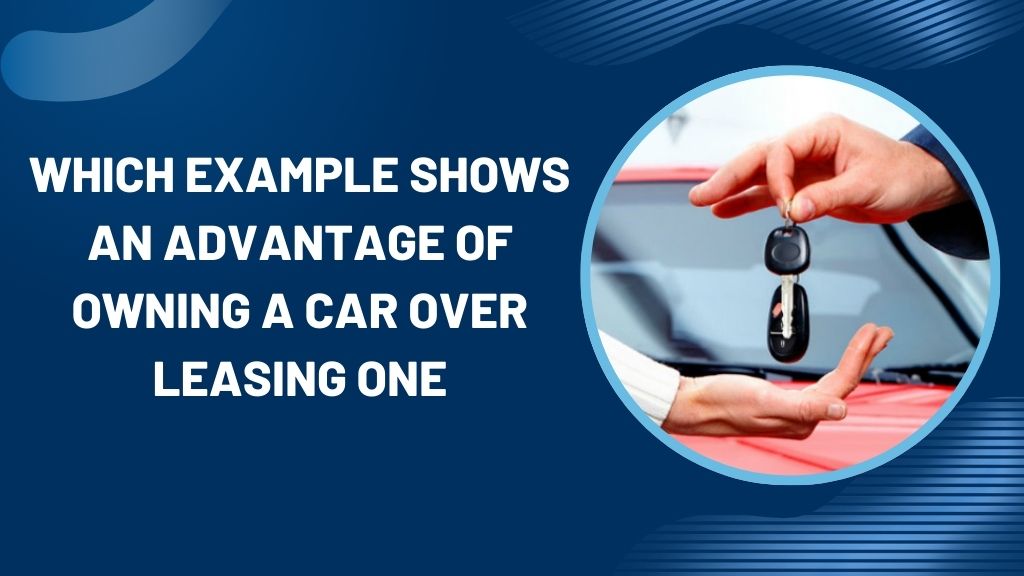Which example shows an advantage of owning a car over leasing one? Many people face the decision of whether to buy or lease a car, and understanding the benefits of ownership is important. Owning a car gives individuals full control over their vehicle without restrictions, allowing them to modify, drive unlimited miles, and avoid long-term lease expenses. While leasing may seem attractive due to lower monthly payments, ownership provides long-term financial benefits.
In this blog we will explore different examples that highlight the advantages of owning a car over leasing, making it easier for potential car buyers to make an informed decision.
Understanding Car Ownership and Leasing
Before diving into the advantages of owning a car, it is important to understand the difference between car ownership and leasing.
What is Car Ownership?
Car ownership means purchasing a vehicle, either by paying the full price upfront or financing it through a loan. Once the loan is paid off, the car belongs to the owner, and they can use it as they please without any restrictions.
What is Car Leasing?
Car leasing is similar to renting a vehicle for a fixed period, usually 2-4 years. The lessee makes monthly payments but does not own the car. At the end of the lease, they must return the car or buy it at a predetermined price.
Also read: What Is the Right Way for a Student to Manage Stress After a Long Day of Studying?
Which Example Shows an Advantage of Owning a Car Over Leasing One?
Example 1: No Mileage Restrictions
Scenario: Sarah is a sales representative who frequently travels long distances for work. If she leases a car, her contract may limit her to 12,000 miles per year. Exceeding this limit will result in expensive penalties. However, if Sarah owns a car, she can drive as much as she wants without worrying about additional charges.
Advantage: Car ownership allows unlimited mileage, making it a better option for individuals who travel frequently.
Example 2: Long-Term Financial Savings
Scenario: John purchases a car with a five-year loan. Once he finishes paying off the loan, he no longer has monthly car payments, and the vehicle is his to keep. In contrast, his friend Mike leases a new car every three years, meaning he continues paying indefinitely.
Advantage: Car ownership results in cost savings in the long run, as the owner is not required to make continuous payments beyond the loan period.
Example 3: Freedom to Customize
Scenario: Emily loves modifying her vehicles by adding custom paint, upgraded rims, and a new sound system. Since she owns her car, she can make any changes she desires. On the other hand, her friend Lisa leases a car, and her lease contract prohibits any modifications.
Advantage: Car ownership provides full control over modifications and personalization.
Example 4: No Wear-and-Tear Fees
Scenario: David has two young children who occasionally spill drinks and leave scratches on the car’s interior. If he were leasing the vehicle, he would have to pay for any wear-and-tear damages at the end of the lease. However, since David owns the car, he does not have to worry about extra fees.
Advantage: Owning a car eliminates the risk of extra charges for minor damages.
Example 5: Building Equity
Scenario: Rachel purchases a car using a loan. Over time, as she makes payments, she builds equity in the vehicle. Once she pays off the loan, she owns the car outright and can sell it for a good price. In contrast, leasing does not build equity, as the payments only cover the cost of using the car temporarily.
Advantage: Ownership helps in building equity, providing financial benefits when selling the car in the future.
Example 6: No Monthly Payments After Loan Completion
Scenario: Mark decides to finance a car with a five-year loan. After five years, he fully owns the car and no longer has to make monthly payments. Meanwhile, his friend Tom leases a car and continues making monthly payments indefinitely, as he upgrades to a new lease every few years.
Advantage: Car ownership provides financial relief once the loan is fully paid off.
Example 7: Ability to Sell the Car Anytime
Scenario: Jessica buys a car but later decides to move to another city where she no longer needs it. Since she owns the car, she can sell it whenever she wants. On the other hand, her friend Alex leases a vehicle and must wait until the lease term ends or pay a costly early termination fee.
Advantage: Car ownership offers the flexibility to sell the vehicle at any time without penalties.
Example 8: Lower Insurance Costs
Scenario: Michael owns a 5-year-old car and notices that his insurance premiums are much lower compared to his sister, who leases a brand-new vehicle. Since leasing companies often require higher insurance coverage, lease payments can be more expensive.
Advantage: Owning a car can lead to lower insurance costs over time.
Challenges of Owning a Car
While ownership has several advantages, there are also some challenges to consider:
- Higher Upfront Costs: Buying a car requires a significant initial investment.
- Maintenance Costs: Owners are responsible for repairs and maintenance.
- Depreciation: The car’s value decreases over time.
Challenges of Leasing a Car
Leasing also has certain disadvantages:
- Continuous Payments: The lessee never owns the car and must keep making payments.
- Mileage Restrictions: Exceeding the mileage limit results in penalties.
- No Customization: Lease agreements prohibit modifications.
- Wear-and-Tear Fees: Any damages must be paid for at the end of the lease term.
Final Thoughts: Which Option is Better?
The decision between buying and leasing depends on individual needs. If someone wants to drive a new car every few years with lower monthly payments, leasing may be a good option. However, if someone prefers long-term financial savings, freedom from restrictions, and equity building, owning a car is the better choice.
Conclusion
Which example shows an advantage of owning a car over leasing one? As seen in the examples above, ownership provides several benefits, including unlimited mileage, financial savings, customization freedom, and the ability to sell the car anytime. While leasing may seem convenient for short-term users, long-term ownership provides greater value. Understanding the advantages of car ownership helps individuals make informed decisions about their transportation needs.

